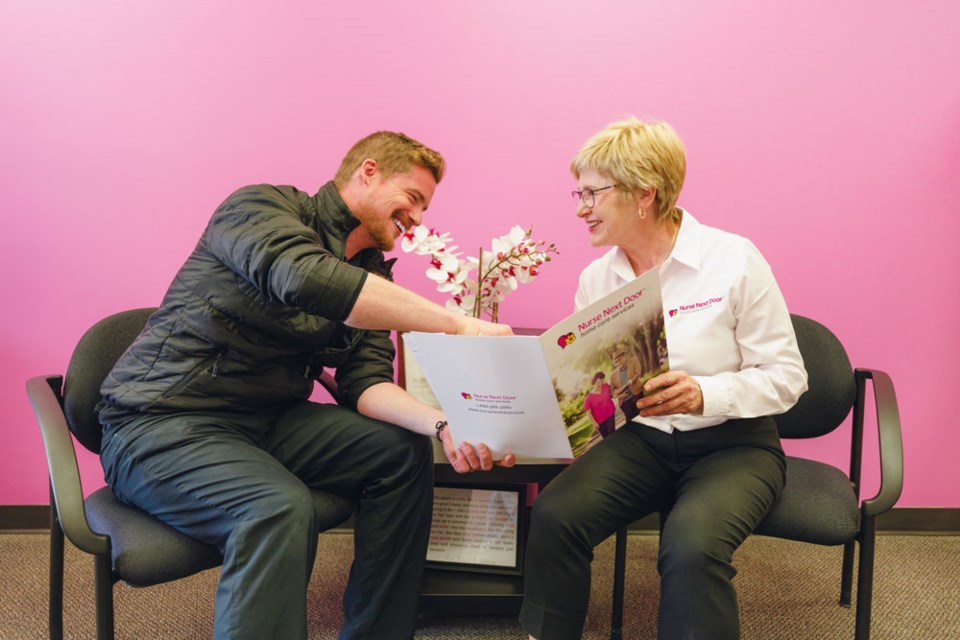Life is a journey, one full of decisions on which route to follow, and when to make that move.
Care, as we age, is part of that.
If you have an aging parent, or loved one, in your life who is reaching the point where some assistance can provide a much-needed lift in their quality of life, Nurse Next Door can assist in having that discussion on what is possible in terms of outside help.
“There are really two ways people find us,” says Carol Lange, owner of Nurse Next Door in the TriCity region. “First, and most often, a crisis occurs. The second way is when the children of elderly parents have actually sat down and talked about the future.”
In some instances, adult children may not be fully aware their elderly parent could benefit from some additional, outside care in their home.
Here are some warning signs your aging parent or loved one may need help with living independently:
- Repeated falls or repeated visits to the emergency unit
- Alzheimer’s or other types of dementia is worsening
- Chronic health conditions not under control
- Weight loss or dehydration due to poor appetite or missed meals
- Neglected personal hygiene
- Increased forgetfulness or not taking medications
- Changes in behaviour or signs of depression
- Does not want to move to assisted living or a nursing home but needs assistance
If this sounds familiar, homecare is likely needed and can be safer, happier and less expensive than moving to Assisted Living. Services from a home care company can be added alongside Fraser Health homecare and can range from a few hours a week, to round-the-clock care.

Lange says many seniors will deny needing any help as they don’t want to be a burden to their family. Others may be fearful that just talking about needing help could cause families to head down the road of moving them out of their beloved home. So, it’s really important to encourage any care needed, as a way to help them stay independent and safe in their own home.
There are some leading indicators that can bring the idea of having in-home care up for discussion.
“Sometimes the discussion can start when an elderly parent has started having falls, more than once over a period of six months,” Lange explains. “It’s very important to understand the cause of the falls, because 1 in 3 seniors falls each year, and many end up in hospital. If an injury happens, a senior can quickly lose their independence and choices.
“Or, they may have had a series of hospital visits. Perhaps, they are losing weight or becoming forgetful. These are important signs to take seriously, before the parent has a serious fall or ends up in an ER. Adult children can use the opportunity to have a conversation and ask the parent where they want to live. If staying at home is their heart’s desire, there are options and resources that families can access.
Working with a homecare company can be especially helpful if an adult child lives in another city, far from their parents, or they have a busy schedule with their own children and work commitments.
“Sometimes, all it takes to prevent a crisis is to have someone visit a few times a week, in addition to family care,” Lange says. ”We have seen this keep seniors safe and out of the hospital system. With ER waits now ranging from five to 14 hours, it’s even more important than ever.”
Lange explains that when you start from a place of respect for the senior’s wishes and respect for their autonomy, it’s an easier discussion. Then a trial run can be arranged.
And once that has been set up, Lange said a sense of relief usually settles in - for everyone involved.
Are your parents resistant to having care?
Take heart, you’re not alone. Around 80 per cent of elderly clients are resistant. In fact, it’s so common that Nurse Next Door created a handout called “Getting to Yes” with tips on how to encourage the care needed. Please email [email protected] if you’d like a free copy.
For more about Nurse Next Door and how they can provide solutions for your care needs, visit their website at nursenextdoor.com/locations/coquitlam-port-coquitlam-bc.



